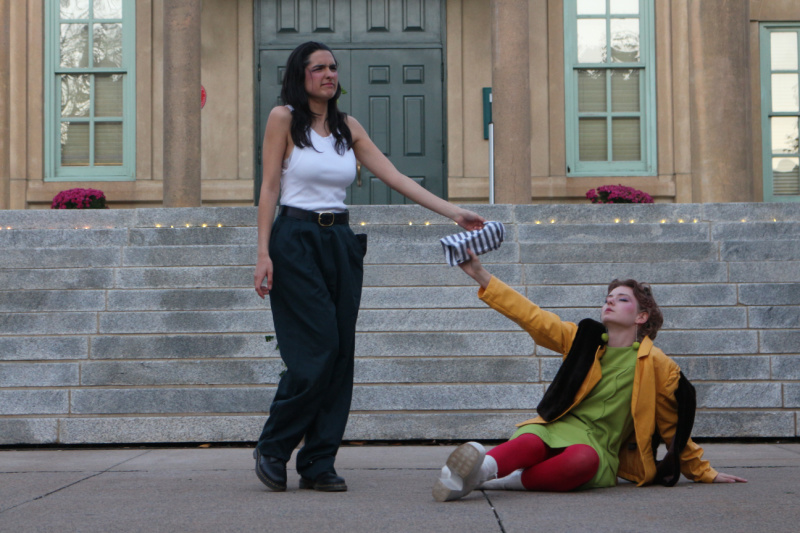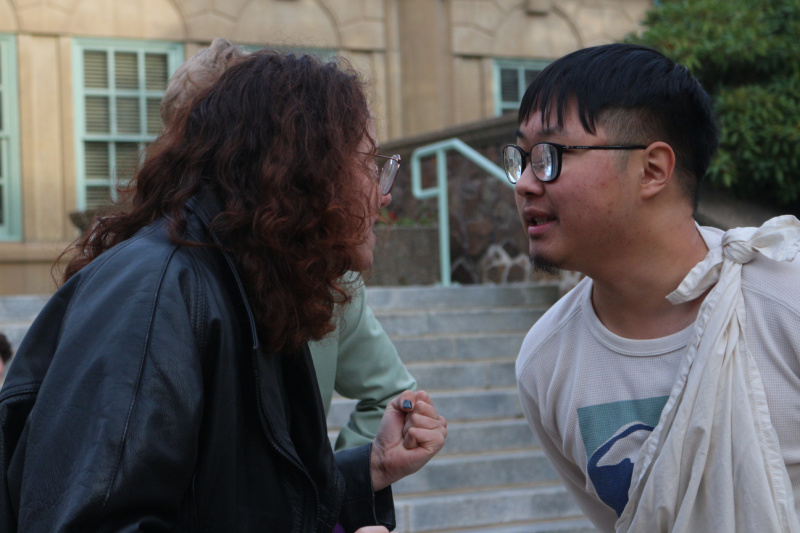A comedic delight by Aristophanes, this year’s annual outdoor performance by the King’s Theatrical Society had audiences hopping for joy.
Every year in October, the King’s community gathers on the Quad for a time-honoured tradition, to watch a play from antiquity while wrapped in blankets and sipping hot chocolate.
Classics in the Quad is an annual performance held on the steps of the library. Each production is a selection inspired by the Foundation Year Program’s study of texts from antiquity. Casting preference is given to first-year students looking to get involved with the King’s Theatrical Society.
This fall’s production was The Frogs, a comedy written by Greek dramatist Aristophanes around 405 BC. The play features Dionysus (Wren Jarek-Simard), the ancient Greek god of drama, who is mourning the loss of his favourite poet, Euripides (Tara Coulter). Disguising himself as the hero Heracles, Dionysus descends into the underworld with his servant Xanthias (Jade Geddes) to retrieve his friend. Upon entering the underworld, Dionysus judges a poetry contest between Euripides and his predecessor, Aeschylus (Tristan Walhain). After deciding that Aeschylus’s talents would better serve Athens, he abandons Euripides in the underworld and leaves with Aeschylus instead.
Together, the cast did an excellent job of bringing the play’s comedic factor to life through dramatic actions and vivid facial expressions so that even students without extensive knowledge of the play or Greek poetry could follow the story. Each character came across as unique in personality and motivation—from Xanthias’s exasperated frustration at the theatrics of his master, to Dionysus’s dramatic fits and faulty disguise as Heracles. The cast drew the audience through the many twists and turns of this journey into the underworld.

The costumes, a collaboration between the producers and directors (Charlotte Hawboldt and Leah Parker), the stage managers (Aliyah Daya and Indira Morellon) and the cast, helped the audience determine a character’s significance and personality. The Chorus, dressed in white clothes, both spoke and appeared as one unit. Xanthias’s plain white shirt and navy trousers vastly contrasted Dionysus’s bright and eye-catching colours, signifying their difference in status.

The battle between Euripides and Aeschylus utilized both the actors’ talents and the power of colour association to emphasize the opposing nature of each poet. Euripides, in black pants and a leather jacket, spoke brashly with a snarky attitude befitting his rebellious, entitled nature. Stiff and rigid Aeschylus wore the traditional white chiton and sandals associated with the ancient Greeks. As the upholder of traditional prose, he was quick to anger and easily irritated by Euripides’s insults. The quick-witted banter between the two poets was sprinkled with comedic insults that drew from the audience bouts of laughter and applause. The actors deftly battled through prologues and lyrical verses to determine which character was superior at the craft.
Walhain (Aeschylus) said the production’s time crunch was a challenge. “We had a limited time to learn a whole lot of monologues,” he said. “But it was so fun! You meet people. You’re in a community; you’re part of a group. It’s a really fun experience.”
“Tristen and I worked really well, bouncing off each other, says Coulter, who played Euripides. “It was a great experience.”
Coulter praises the play as a comment on artistic judgement, hidden beneath superficial critiques and witty prose. “That’s part of the larger thing going on with the play. How do you judge art? It’s cool.”

